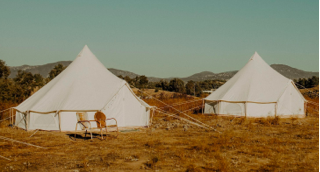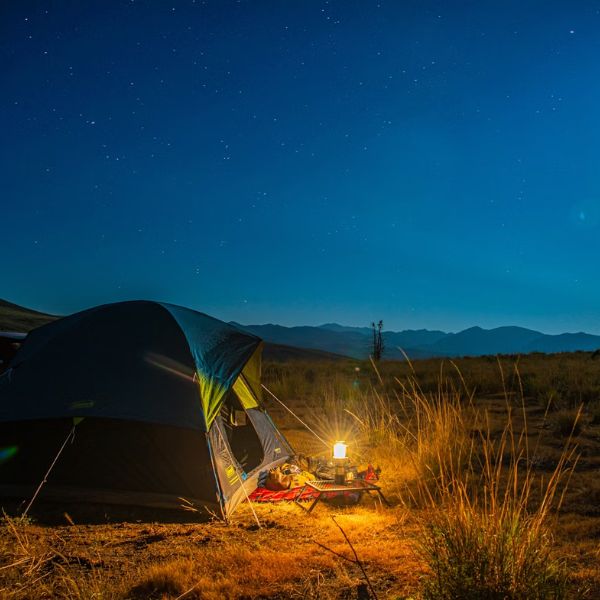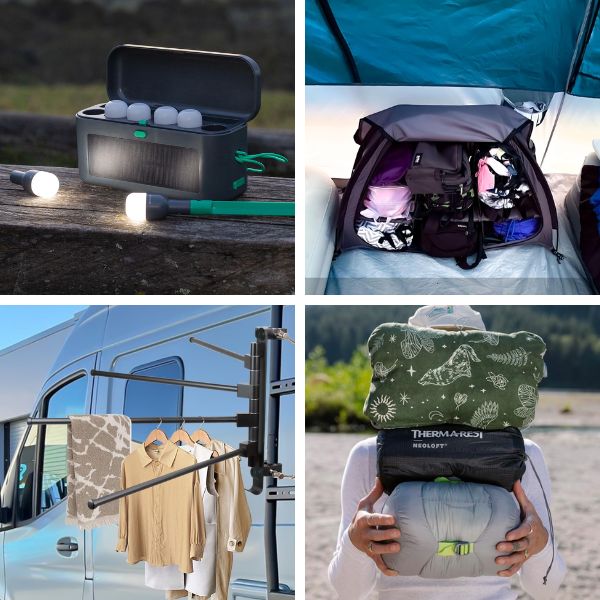FREE SHIPPING
PAY NO SALES TAX
Menu
-
- Shop
- Glamping Tents
- Wall Tents
- Canvas Tent
- Bell Tents
- Festival Tents
- Hunting Tents
- Yurt Tents
- Family Tents
- Stargazing Tent
- Cabin Tents
- Camping Gifts
- Overland Tents
- Tent Stoves
- 4 Person Tents
- 6 Person Tents
- 8 Person Tents
- 12 Person Tents
- Canvas Bags
- Camp Gears
- Camping Chairs
- Shade Canopy Tents
- Camping Fans
- Resources
- About
- Contact Us
- Reviews
-
- Login

Free Shipping

Pay No Sales Tax
30-Month Warranty
FREE SHIPPING
PAY NO SALES TAX
Tents
Shop


The LiT List
Glamping & Camping Ideas + Resources
How to Stay Safe While Camping
4 min read
Want to know how to stay safe while camping? If safety is a top concern for your family when headed to the great outdoors, we’re here to ease your troubles. From choosing a 4 person tent for adequate shelter to securing food away from wildlife, here are several ways campers can plan appropriately and be mindful to enjoy a safe outdoor adventure.
Choose an Appropriate Shelter
One of the best ways to stay safe while camping is to choose an appropriate shelter. In other words, a durable tent, and one that is well-placed on a site and set back from steep drop-offs, rivers or lakes.
Canvas tents – whether it’s an A-frame style 4 person tent or a spacious 20-foot diameter bell tent – are ideal. With a long camping history, rugged canvas tents stand up to all kinds of weather and offer exceptional stability. Plus, they can keep you warm in colder temps while still offering breathability in summer months.
Check the Weather Before Heading Out
Always check (and even keep an eye on!) the weather forecast before setting off on your camping trip.
Many campers can handle a light drizzle on a tent roof. It’s a great excuse to tuck inside for games and reading. But the last thing you want is to find yourself against nasty weather like thunderstorms, flooding, or simply below-freezing nighttime temperatures. Even if the weather is normal, simply knowing what you’re up against helps you decide whether to reschedule the camping trip or embrace it, packing appropriate clothes and venturing out anyway.
Also, if you’re camping in areas that experience smoke (like Oregon or California), use an app like AirCare to check AQI (Air Quality Index) levels and avoid air pollution.
Pack the Right Clothes and Protection
Once you have an idea of the weather forecast, you can pack protective clothing, accessories, and other gear to help you stay safe while camping. We won’t go into a deep dive of camp clothing, but just consider the following item:
Sun protection: Summer or winter, it doesn’t matter! Grab sunscreen, chapstick, a broad-brim hat to cover your face, and wear UPF clothing if possible to stay safe from the sun while camping.
Winter protection: Warmer clothes and multiple layers. Beanies, gloves, socks, and baselayers are a must. Wool is an excellent material to use, keeping you warm while offering mixture-wicking properties.
Rain protection: For rainy days and wet environments, waterproof boots will keep your feet dry. Bring water-repellent outerwear and an umbrella too – just in case!
Bring Enough Water and Keep Food Cold

Dehydration can sneak up pretty quick, so remember to stay hydrated!
Make sure to carry one gallon per camper, per day. This exceeds the 64-ounce recommendation, but for good reason: Camping and spending time outdoors typically requires more energy. Plus, being outdoors in the hot sun can make you sweat harder, even if you’re just sitting around.
Headed into the deep wilderness and want to forgo bringing tons of water? Find a site near a water source and bring along a water filtration system to help you replenish.
Also, learn the signs of dehydration!
Another way to stay safe while camping is to keep perishable food cold and in coolers. Food-borne illnesses and food poisoning is a real possibility if your cooler fails to keep meats and other food properly preserved.
In addition, it’s important to separate raw foods and wash your hands as you prepare dishes.
One way to keep a clean prep area is to bring along a camp kitchen and designate a separate area for cleanup.
Be Mindful of Wildlife
Okay, this safety concern is one that new campers often worry about. Snakes, spiders, bears; it pays to know what roams the area. On top of that, it pays to know how to avoid contact and how to react if you do come face-to-face with something.
In general, keep coolers and food – anything with a scent that could attract wildlife – secure. If there’s a bear box, use it! If not, your best option is to hang food in a tree. If bears are not part of the equation, you can store food inside the car – but only then! Bears have surprisingly nimble little paws and lots of strength. They’re known to open car doors and break windows.
Understand Fire Safety

Fire safety is a big concern, especially in drought conditions. Maintain your fire and keep it contained to a fire pit or fire ring. This will help to ensure it doesn’t get out of hand.
Also, never leave a fire unattended and always put it out before leaving the campsite or heading to bed. Pour water over hot embers and snuff out your wood stove too.
It’s also a wise idea to position tents away from bonfires. Or, you can forego the firepit altogether and opt for a wood stove – a nice alternative to keep a canvas tent warm!
Pack a First Aid Kit and Emergency Medications
Always pack a First Aid Kit – or even make your own! A DIY outdoor first aid kit pulls together extra specific items like sunburn relief, insect bite remedies, and more.
Also be sure to pack special medications needed for each camper. For example, an EpiPen for campers with allergies.
Be mindful of how everyone’s body reacts. Swelling or shortness of breath could be signs of unseen problems like insect bites.
It doesn’t hurt to know where the closest hospital is either!
Take a Wilderness First Aid Course
Take your camping safety a step further by signing up for Red Cross Wilderness First Aid Training. This hands-on training is usually offered by local outdoor sporting goods stores.
Knowing how to handle emergency situations in the wild – when you’re far from medical assistance – could even save a life.
Leave a comment
Comments will be approved before showing up.
Related Resources

THE LIT LIST 5 min read
Top 10 Features to Look for in a Camping Lantern
An essential piece of gear for any outdoor enthusiast is a camping lantern. Whether setting up camp,In search of the perfect camping lantern? Here are some top features to look for, from rechargeable battery and solar to dimmable LED brightness settings and more.

THE LIT LIST 7 min read
The LIT Guide to Camping Tent Accessories
The right accessories for camping tents can turn a simple shelter into a cozy, well-equipped retreatElevate your outdoor experience with the right camping tent accessories.
Popular Blogs
Camping Gift Ideas for People Who Have Everything
The Best Portable Tent Heaters - Ways To Heat A Canvas Tent
Glamping in Northern California: 8 Luxury Sites
Waterproofing A Canvas Tent - Retreating Canvas
33 Camping Quotes to Inspire Your Next Adventure
What Is Glamping? Origins, Definition, Destinations & More
10 Tips for Staying Warm While Winter Camping
How to Maintain and Clean a Bell Tent
Essential Family Camping Checklist: What to Pack [PRINTABLE]
Backyard Glamping Checklist for an Unforgettable DIY Glampsite
Popular Products
Subscribe
Sign up to get the latest on sales, new releases and tips
BECOME AN INSIDER
We’ll periodically share inspiration, bell tent releases, special offers, and event notifications with ya.


